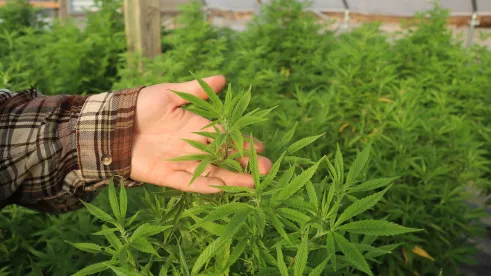Business transactions come with the risk that litigation may arise at some point in the life of the parties' dealings.
Transactions involving hemp—whether pertaining to its growth, production, or sale—are not immune. In addition to the ever-changing regulatory minefield that the burgeoning hemp industry must navigate, the risk of civil litigation is ever-present and real for hemp growers, sellers, buyers, and producers.
As the industry develops and grows, it should expect an increase in civil litigation among industry participants, as well as between industry participants and the consuming public. The types of legal disputes that can arise in these contexts are vast and varied. They may often include claims for breach of contract, or other similar claims, like breach of express or implied warranties, which may arise under the Uniform Commercial Code ("UCC"). But they also may entail various tort-based claims, like tortious interference with contract, misrepresentation, fraud, defamation, slander, libel, and unfair and deceptive trade practices, just to name a few. And it is reasonable to expect class-action litigation stemming from the use of hemp-based products will continue to affect the industry.
Because more and more hemp-related litigation is apt to crop up (yes, we went there), industry participants should consider taking some proactive efforts to mitigate their risks. This article focuses on two very basic but critical risk management endeavors. First, plan, and plan well. And second, know thy business partners.
Plan and plan well. Because many disputes in the industry will rest on contract and commercial law-based principles, industry participants must anticipate and prepare for potential bad business deals or other pitfalls when drafting their contracts. As a general rule, courts try to enforce a party's contract, at least when doing so does not run afoul of the jurisdiction's public policy. Taking the time on the front end to ensure that contracts are well thought out and detailed could save time and money if a dispute later arises. While relying on boilerplate or form contracts may be a cheaper option, these contracts may lack an understanding of industry regulations. Likewise, form contracts are unlikely to be tailored to meet the parties' specific needs. In either situation, a dispute over a form contract could cost substantial time and money.
A recent example of this can be found in a March 2020 North Carolina Court of Appeals opinion, Industrial Hemp Manufacturing, LLC v. American Hemp Seed Genetic, LLC, No. COA19-679 (N.C. Ct. App. Mar. 3, 2020). Industrial Hemp and American Hemp (a non-North Carolina LLC) agreed that American Hemp would sell hemp seeds to Industrial Hemp and, in return, Industrial Hemp would use its best efforts to grow a specified acreage of hemp biomass and provide a set percentage of that biomass to American Hemp. The parties' contract had a forum selection clause that stated, "Any dispute arising out of or related to this Agreement shall be venued [sic] in Raleigh, North Carolina." After a dispute between the parties arose, Industrial Hemp sued American Hemp for breach of contract; breach of express and implied warranties; intentional misrepresentation or, in the alternative, negligent misrepresentation; incidental and consequential damages; unfair and deceptive trade practices; and fraud. American Hemp responded by filing a motion to dismiss for lack of personal jurisdiction. The trial court denied the motion, citing the parties' forum selection clause, which chose Raleigh, North Carolina, as the proper venue for any dispute. The trial court also cited, among other things, American Hemp's knowledge that the contract would be performed in North Carolina. American Hemp appealed, and the Court of Appeals affirmed the trial court's ruling, determining that the court had personal jurisdiction over American Hemp. While many factors played into the trial court's ruling, it is fair to conclude that American Hemp had not done itself any favors by agreeing to the forum selection clause selecting Raleigh, North Carolina, as the venue.
In the context of contracts for the sale of hemp, a carefully crafted contract is of particular importance. Hemp is considered a good, and therefore, its sale is subject to the pertinent jurisdiction's version of the UCC. To maximize the benefits and minimize the risks inherent in any sale of goods, parties should consult the UCC to determine what effect, if any, it may have on the contract's terms. For example, the UCC has detailed requirements that should be considered when drafting disclaimers of warranties. If the contract does not satisfy those requirements, that failure could render the disclaimers ineffective. The UCC also offers a host of remedies for both sellers and buyers in circumstances such as, for example, the buyer's insolvency and in the case of fraud.
There is no question the hemp industry is subject to a unique and rapidly evolving regulatory framework, which adds a layer of complexity when negotiating a contract and navigating emerging commercial relationships.
Know thy business partners. Commercial disputes tend to be high-stakes, high-stress, and can rise to the level of "betting the farm" (sometimes literally so in the case of hemp). At times, they can become ugly and personal. A recent and close to home example of this can be found in Danny Ford v. Charleston Hemp Company, LLC, a case filed this month in the Court of Common Pleas in Anderson County, South Carolina. The plaintiffs in the case are hemp farmers, who were growing hemp for commercial sale. The defendants agreed to extract and process their crop into marketable oils. After a dispute arose about the quality of the defendants' services, the plaintiffs sued, alleging negligence and recklessness, negligent misrepresentation, and defamation. The plaintiffs seek, among other things, emotional distress damages. In support of their claims, the plaintiffs alleged three primary issues: (1) that the defendants targeted the plaintiffs with inaccurate promises regarding the defendants' competence, knowledge, experience, and ability to appropriately handle, extract, and process the Plaintiffs' hemp crop into marketable oils; (2) that the defendants negligently extracted and processed the plaintiffs' crop; and (3) that the defendants made and published false statements that some of the plaintiffs were incompetent or unfit for their occupation or trade.
Knowing your business partners is crucial. Though you cannot know everything, you should perform what due diligence you can before sealing the deal. That means knowing the right questions to ask prospective business partners. This could entail asking questions designed to demonstrate the prospective business partner's level of knowledge and competence to perform under the anticipated contract's terms, to provide transparency about the partner's financial risk tolerances, and whether the partner has any experience with litigating commercial disputes. These questions may be uncomfortable to ask or to answer. But your prospective business partner's responses could provide you with invaluable insight. And if your potential partner refuses to answer some basic questions, that too may be insightful.
Litigation in the hemp industry will become more prevalent as the industry grows. To mitigate the risks attendant to litigation, you should invest in solid contracts and relationships on the front end. Doing so can go a long way in mitigating the risks attendant to any commercial relationship. Having legal representation familiar with the hemp industry and the unique challenges it faces industry litigation trends, and market players could prove invaluable.





 />i
/>i

